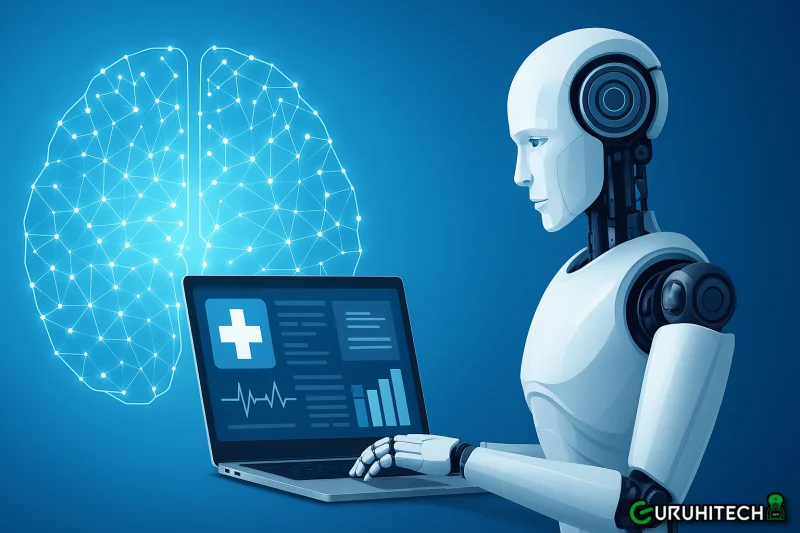From Code to Cure: Building Intelligent Healthcare Software Products with AI at the Core

Artificial Intelligence (AI) is redefining the future of healthcare. What was once a data-driven support system has evolved into an intelligent ecosystem capable of diagnosing, predicting, and even prescribing treatments. For decision-makers, startups, and enterprises venturing into healthtech, the challenge isn’t just about coding an application—it’s about creating intelligent solutions that can make a tangible difference in patient outcomes.
If you’re looking to build healthcare software that merges innovation with clinical excellence, AI must sit at its core.
The AI Revolution in Healthcare Software
AI’s role in healthcare has grown beyond automation. It now assists in clinical decision-making, improves patient engagement, and optimizes operational efficiency. Here’s how AI is transforming the landscape:
- Predictive Diagnosis: Machine learning models identify early disease indicators from imaging, lab data, or patient history.
- Personalized Treatment: AI recommends care plans tailored to individual genetics and lifestyles.
- Operational Efficiency: Hospitals leverage AI-driven analytics to reduce wait times and streamline resource allocation.
- Remote Patient Monitoring: IoT and AI work together to track vitals and alert caregivers in real time.
AI is helping healthcare providers move from reactive care to proactive wellness—making the “code to cure” journey faster, smarter, and more human-centered.
Building a Smarter Healthcare Product: What It Takes
To develop intelligent healthcare solutions, technology leaders and entrepreneurs must go beyond traditional software design. A successful AI-powered product needs:
- Robust Data Infrastructure
Quality data is the foundation of effective AI. Secure collection, storage, and cleaning of healthcare data are critical for reliable insights. - Interoperability
Seamless data exchange between systems—EHRs, wearables, and hospital networks—is essential for holistic patient care. - Regulatory Compliance
Building HIPAA-, GDPR-, or HL7-compliant systems ensures patient data privacy and builds trust. - Ethical AI Implementation
Bias-free algorithms and explainable AI models maintain fairness and transparency in patient decisions. - Scalability and Cloud Integration
Future-ready systems should easily adapt to growing datasets, user bases, and evolving technologies.
Enterprises and startups that focus on these fundamentals are best positioned to build healthcare software that’s scalable, secure, and truly transformative.
AI-Driven Use Cases That Are Shaping Modern Healthcare
- Virtual Health Assistants: AI chatbots offering 24/7 patient support.
- Radiology Automation: Deep learning models enhancing image-based diagnostics.
- Drug Discovery: AI reducing the time and cost of clinical trials.
- Population Health Analytics: Predicting outbreaks and tracking public health trends.
- Precision Medicine: Leveraging genomic data for personalized therapies.
Each of these applications represents how AI-driven innovation is helping healthcare enterprises achieve better outcomes while optimizing operational costs.
Challenges to Overcome in AI Healthcare Development
While the opportunities are massive, challenges remain—especially for startups and enterprises building from scratch. Common roadblocks include:
- Limited access to quality datasets
- Integration issues with legacy hospital systems
- Ethical and regulatory complexities
- Need for cross-functional collaboration between clinicians and developers
These challenges underline the importance of working with technology partners who understand both healthcare operations and advanced AI frameworks.
From Idea to Implementation: Making AI Work for You
Whether you’re a healthcare startup building your first MVP or an enterprise modernizing legacy systems, success depends on strategic planning and deep domain expertise.
To effectively build healthcare software, you need:
- A clear understanding of end-user pain points
- Access to domain-specific data for AI training
- Partnerships with experienced AI and healthcare developers
- Continuous testing and validation with real-world medical environments
Building intelligent healthcare systems is not just about innovation—it’s about accountability, trust, and measurable results.
Final Thoughts
AI is not replacing healthcare professionals—it’s empowering them to deliver faster, more accurate, and personalized care. The next generation of healthcare software will go beyond data management—it will think, learn, and evolve with every interaction.
If you’re ready to turn your healthtech vision into a market-leading product, it’s time to build healthcare software that embodies intelligence, compliance, and compassion—from code to cure.
Ti potrebbe interessare:
Segui guruhitech su:
- Google News: bit.ly/gurugooglenews
- Telegram: t.me/guruhitech
- X (Twitter): x.com/guruhitech1
- Bluesky: bsky.app/profile/guruhitech.bsky.social
- GETTR: gettr.com/user/guruhitech
- Rumble: rumble.com/user/guruhitech
- VKontakte: vk.com/guruhitech
- MeWe: mewe.com/i/guruhitech
- Skype: live:.cid.d4cf3836b772da8a
- WhatsApp: bit.ly/whatsappguruhitech
Esprimi il tuo parere!
Ti è stato utile questo articolo? Lascia un commento nell’apposita sezione che trovi più in basso e se ti va, iscriviti alla newsletter.
Per qualsiasi domanda, informazione o assistenza nel mondo della tecnologia, puoi inviare una email all’indirizzo [email protected].
Scopri di più da GuruHiTech
Abbonati per ricevere gli ultimi articoli inviati alla tua e-mail.
